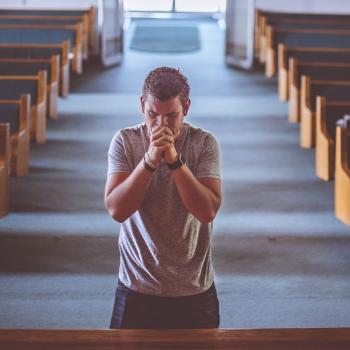What God gives us—chooses of God's own free will to give us—is love, and the sense of God's presence in all times, good and bad. What God offers us is relationship, and that is pure grace, certainly more than we deserve.
When I first started working on this book, one day I was in Union Station in Washington, D.C., people watching while I waited for my train. A young couple caught my eye—a handsome young soldier and his beautiful girl in a red dress were walking hand in hand—when suddenly they turned, twirled, and were dancing under the vaulted ceiling. As they danced, they looked at each other, whispered to each other, and laughed. In that moment, I believe they were totally and completely alive.
God has created us for relationship with him, as the Genesis story of Adam and Eve first tells us. It's almost impossible to take this story literally as an account of the two first human beings, but we can take it seriously as a story of how God seeks to be in relationship with us—and seeks our obedience and acquiescence.
But we have to be willing to give ourselves to the dance.
If the girl loves her soldier, she will not force him to love her—in fact, since he has been created with opinions and free will, she cannot force him. She can only trust that if he loves her as she loves him, that he will tell her—and show her—by taking her hand, by stepping out onto the dance floor.
Our relationship with God operates in similar fashion. God's hand is extended to us from before our ability to respond to it. God has always loved us. And God will go on loving us, even if we do not take God's hand and step out on the dance floor, even if we do not choose to love God back. But if we do choose this, we enter into the fullness of life and experience all that God has planned for us.
It is by thinking of belief as relationship—rather than belief as an exam we must pass—that we enter into true life with God. It isn't enough, the Bible tells us, to believe in God. One can believe in God without having a relationship with him, and Jesus tells us in the Gospel of Matthew that when judgment comes, many people will say they believe in Jesus, although they don't honestly know him at all: "'It is not anyone who says to me, 'Lord, Lord,' who will enter the kingdom of Heaven," Jesus tells us, "but the person who does the will of my Father in heaven" (Matthew 7:21 NJB).
The Gospel of Matthew goes still farther; throughout its pages it tells us that belief is not enough, that what we must be doing is what Jesus teaches us to do. Belief should change us. The Greek word metanoia is often translated in the Bible as "repentance," a word that has taken on all kinds of unpleasantness from its use by hellfire-and-brimstone preachers and accusatory Christians. I want to reclaim it for our twenty-first-century Christianity, since what it truly means is transformation, the sense of turning your life around, of becoming an entirely new person.
When you believe, or begin to believe, it should take you from the path you were on and plant your feet on a new one.
Not yet at a destination, of course.
But on the way.
Discussion Questions
- What is your own understanding of what and how we believe in God? Has your conception changed over your lifetime?
- How would the idea of pilgrimage differ from the mainstream idea of the profession of faith? What does each idea offer?
- The author writes that we should not expect God to do what we want. How does this differ from some understandings of religion? Why do we pray if not to get what we want?
- Can you remember a time when you or someone you know changed for the better? What caused that change?
For Further Reflection and Study
Barbara Brown Taylor, Leaving Church: A Memoir of Faith (San Francisco: HarperSanFrancisco, 2006). In this personal account of her journey of faith, Taylor recounts her transition from priest to professor, from someone who experienced God primarily within the church to one who found God all around her.
Paula Huston, By Way of Grace: Moving from Faithfulness to Holiness (Chicago: Loyola Press, 2007). In this book about faith translated into virtues, Huston explores transformative Christian faith and practice by focusing on the cardinal virtues of the faith as exemplified by different saints.
Brian McLaren, A Generous Orthodoxy (Grand Rapids: Zondervan, 2004). McLaren explores the variety of ways Christians have believed, arguing that each offers something of value, that too many artificial distinctives are introduced alongside real doctrine, and that belief not put into action is dead.
Rowan Williams, Tokens of Trust: An Introduction to Christian Belief (Louisville, KY: Westminster John Knox Press, 2007). The archbishop of Canterbury introduces the most important elements of Christian faith by taking readers on a guided tour of the great creeds. The central idea: God is worthy of our trust.





